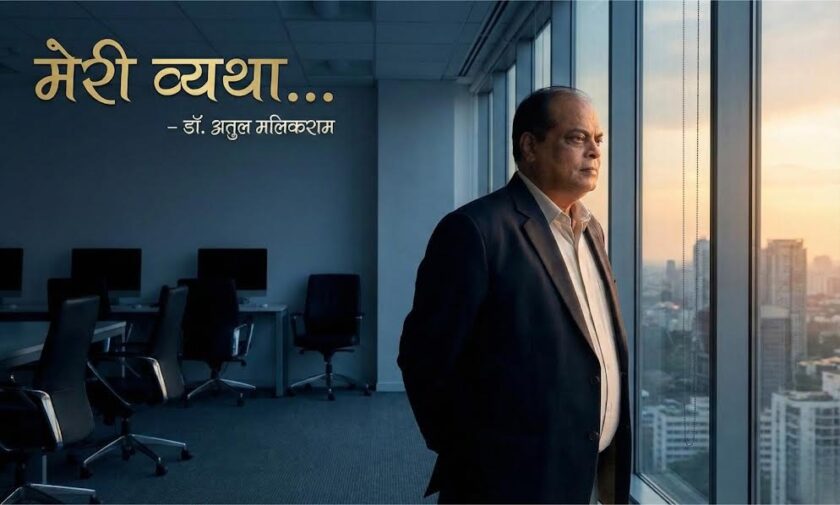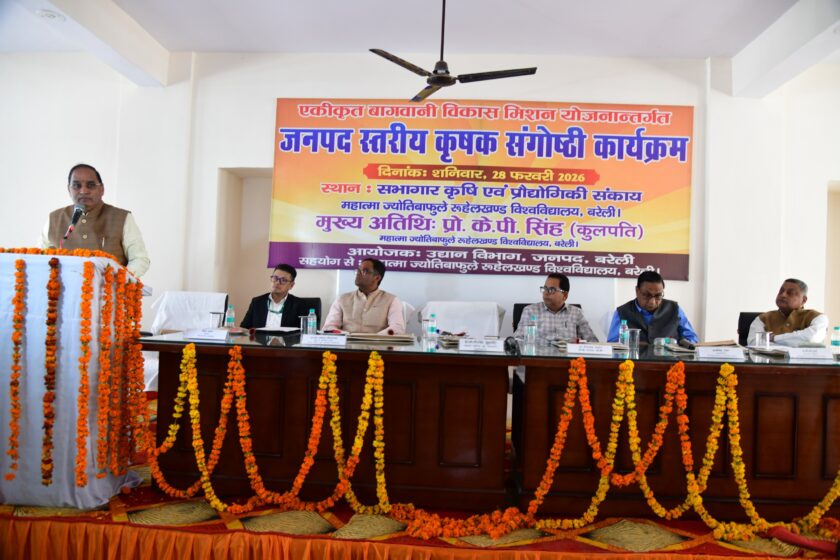Dr. Navneet Kumar Gupta
India’s space journey has always been a symbol of inspiration and scientific progress. ISRO’s missions like Chandrayaan and Mangalyaan have enhanced India’s prestige on the global stage. Now a new and proud name has been added to this series – Group Captain Shubhanshu Shukla, who is an experienced pilot of the Indian Air Force and who recently traveled to space under Axiom Space Mission-4 for the International Space Station.
It is a matter of pride that an Indian has reached space 41 years after Squadron Leader Rakesh Sharma stepped into space. It is noteworthy that in the year 1984, Indian Air Force officer Rakesh Sharma spent about eight days on the Salyut-7 space station of the then Soviet Union. This was a very important event, which gave a new impetus to India’s space journey.
The agreement between Prime Minister Narendra Modi and then US President Joe Biden in 2023 gave impetus to the Axiom-4 mission. Due to which we were able to send another Indian to space after four decades. This flight was delayed due to several technical reasons, but finally the successful launch of the spacecraft was possible on June 25, 2025.
A Houston-based American company named Axiom Space has started this mission in collaboration with NASA and SpaceX. Along with Group Captain Shubhanshu Shukla, there are also astronauts from Poland, Hungary and America in this mission.
Shubhanshu Shukla is not only a future pioneer representing India in space, but he is an inspiration for those Indian youth who dream of making a career in science, space and defense sector.
His name as a member of the astronaut team was first officially announced publicly on February 27, 2024, when Prime Minister Shri Narendra Modi announced the names of the members of the astronaut team for India’s first space mission at ISRO’s Vikram Sarabhai Space Center in Thiruvananthapuram.
Family of Shubhanshu Shukla
Shubhanshu Shukla’s father Shambhudayal Shukla retired from the Uttar Pradesh Secretariat in 2013. His mother Asha Shukla has been a housewife. Shubhanshu has had the support of his parents throughout his journey. He also has two sisters. Shubhanshu Shukla’s wife Dr. Kamna Mishra is a resident of Lucknow since childhood and has been Shubhanshu Shukla’s friend since Class 3. The friendship of both began during school. Kamna and Shubhanshu’s friendship later turned into a relationship and with the consent of the family, both got married. Both have a six-year-old son.
Early life and education
Group Captain Shubhanshu Shukla was born in a simple family of Uttar Pradesh. From the beginning, he was smart in studies and disciplined. His early education was done in government schools of Uttar Pradesh. He had a keen interest in science and mathematics, due to which he was later attracted to the Indian Air Force. Shubhanshu Shukla graduated from the National Defense Academy (NDA), Pune and obtained the degree of Bachelor of Technology (B.Tech.). Later, he studied Master of Technology (M.Tech.) from Indian Institute of Science (IISc) Bangalore.
Flight experience and special training
Shubhshu Shukla became a fighter pilot after completing flight training from the Indian Air Force Academy, Dundigal. He joined the Indian Air Force as a flying officer and gradually rose to the rank of Group Captain. Group Captain Shukla has extensive experience in operating fighter aircraft. He has flown the MiG-21, Sukhoi-30MKI and other major Indian fighter aircraft. His flying proficiency and technical knowledge have given him a distinctive identity in the Indian Air Force.
An astronaut training program began in 2019 in collaboration with ISRO and the Russian space agency ‘Roscosmos’ to select the Indian astronaut team for the Gaganyaan mission. Shubhshu Shukla was selected for this training and received intensive space training at the Yuri Gagarin Cosmonaut Training Center in Russia. In this training, he was also given practice in microgravity, spacecraft operation, orbital mechanics, life support systems, medical emergencies in space and the Russian language.
International Mission
Shubhanshu Shukla got the opportunity to travel to the International Space Station under the American private space company Axiom Space Mission-4. This mission was carried out by SpaceX’s Crew Dragon spacecraft. Shubhanshu Shukla played the role of payload specialist in this mission and he conducted important experiments for the ISRO and other scientific institutions on the space station. There were three other astronauts with him in this mission.
History made 25 June, 2025
A special live screening of the successful launch of Axiom 4 was held at the Bhatnagar Auditorium of Anusandhan Bhavan in New Delhi. Union Minister of State (Independent Charge) for Science and Technology, Dr Jitendra Singh, along with the audience present, congratulated Shubhanshu Shukla and the other three astronauts when the live screening showed the actual visuals of the launch. Indian astronaut Group Captain Shubhanshu Shukla, who served as the mission pilot, was part of the four- member international team that went to the International Space Station (ISS). It was a historic and proud moment for India as the launch of the Axiom-4 mission is a big leap towards India becoming a developed India.
The spacecraft reached the International Space Station at 4.30 PM Indian time on 26 June. During the formal welcome ceremony at the space station, Shukla said, “I am Astronaut 634. It is a privilege to be here.” He said, “The minute I entered the International Space Station and met this crew, you made me feel so welcome, as if you had literally opened the doors of your home to us.” He further said that it is a privilege to be among the few people who have had the opportunity to see the Earth from this place.
Interaction with Prime Minister Shri Narendra Modi
Prime Minister Shri Narendra Modi spoke to Captain Shubhanshu Shukla aboard the International Space Station on 28 June 2025. The Prime Minister told him that even though he is far away from the motherland, from the land of India, he is closest to the hearts of Indians. The Prime Minister also extended his heartfelt congratulations and best wishes to Shubhanshu Shukla for waving the flag of India in space.
While talking to Prime Minister Shri Narendra Modi, Shubhanshu Shukla, shared his experiences and experiments on the International Space Station, gave a message to the young generation of the country that we have seen very high dreams in the direction in which India is going and to fulfill those dreams, we need youth, so to fulfill that need, I would say that there is no one path to success, sometimes you take one path, sometimes another, but one thing that is natural in every path is that you should never stop trying. If you adopt the basic mantra of ‘keep trying’ in life, then no matter which path you are on, wherever you are, you will definitely get success.

Axiom-4 Mission
The Axiom-4 mission brings together a diverse and accomplished international crew, each of whom has unique expertise in science, engineering, aviation and space research. The mission commander, Dr Peggy Whitson from the United States, is a biochemist by training with a PhD in biochemistry. She has spent 675 days in space over four missions. For her work, she has been awarded the NASA Leadership Medal, Time 100 (2018) and Women in Aviation Lifetime Achievement Award (2017).
The mission pilot, Group Captain Shubhanshu Shukla, is an Indian Air Force pilot and ISRO astronaut. He has undergone rigorous training at the Yuri Gagarin Cosmonaut Training Center in Star City, Moscow, Russia.
Slawoz Uznański Wisniewski from Poland is a mission specialist with cutting-edge technical expertise. He holds a dual M.Sc. degree from Lodz University of Technology and Université de Nantes. In 2011, he also received a PhD from Aix-Marseille University. From 2018 to 2020, he also served as the engineer-in-charge of the Large Hadron Collider, one of the most interesting and important scientific experiments in the world.
The fourth member is Tibor Kapu, a mechanical engineer from Hungary, who is a mission specialist. Kapu has extensive training in space engineering, flight simulation, physical endurance, and scientific research methods. These four astronauts symbolize the growing reach of international cooperation and commercial space missions.
India’s contribution to the mission
Today India has evolved from a technology follower to an equal and respected global partner in space exploration. Group Captain Shukla carried indigenous experiment kits with him in the Axiom-4 mission. These kits were developed by leading Indian institutions such as Indian Institute of Technology (IIT), Indian Institute of Science (IISc) and Department of Biotechnology (DBT). These kits were used to conduct advanced experiments on the International Space Station.
The aim of the biotechnology experiments was to study the effects of microgravity and cosmic radiation on the growth of edible microalgae. Microalgae are a sustainable food source rich in nutrients, proteins, lipids and bioactive compounds, which are ideal for long duration space missions. These studies have contributed significantly to future deep space missions and long term sustainability of human presence in space, the experiences of these experiments will also prove useful in India’s much awaited Gaganyaan mission.
Indian astronaut Group Captain Shubhanshu Shukla also studied the physical, cognitive and functional responses in space as well as the cognitive effects of continuous electronic display in microgravity. Some important research work was also done to focus on skeletal muscle dysfunction and therapeutic solutions.
Shubhanshu Shukla also conducted experiments on the revival, survival and reproduction of extremophiles like tardigrades. These microbes(they are animals) are known for their resilience in extreme conditions and research work on them will be helpful in advancing scientific understanding of the sustainability of life beyond Earth. Extremophiles are organisms that are well adapted to the conditions found in extreme environments such as very hot, cold, acidic or salty areas. Tardigrades, also known as water bears or moss piglets, are a microbe that can survive even in extreme conditions. It does not have a backbone. Tardigrades are known for their hardiness and ability to survive.
It is a matter of national pride that Indian astronauts are an active participant in the Axiom-4 mission and have a role in the international mission.
In fact, more than sixty scientific experiments have been carried out during this mission. Seven experiments were suggested by Indian scientists. India also conducted astro-biology experiments for the first time, in which ISRO and NASA participated.
The Axiom-4 mission is not only a scientific achievement, but also a testimony to India’s growing reputation as a global technology superpower. It also symbolizes the country’s ability to lead space innovation, promote sustainability and make meaningful contributions to global missions.
Achievements of Shubhanshu Shukla
One of India’s first military astronauts: Shubhanshu Shukla is one of the select pilots of the Indian Air Force who got the opportunity of space training and space travel.
- Visit to the International Space Station: Under Axiom-4, he played a role in establishing Indian scientific research in space.
- Cooperation in space science missions of the International Space Station: He carried out microgravity experiments selected by the International Space Station, which provided new scientific information to Indian researchers.
- Increased India’s credibility at the global level: His contribution strengthened India’s presence in international space missions.
How Axiom-4 pilot Shubhanshu Shukla’s experiences will be important for ISRO?
With Shubhanshu Shukla’s flight, India is preparing for its own spacecraft mission in the coming days. Axiom-4 mission is closely linked to our own space plans and its results will prove helpful for Gaganyaan mission and other missions to come after it. Before Gaganyaan, Axiom-4 mission has gone into space, which will give India a lot to learn from.
Human space flight missions are quite complex, especially when you are doing it for the first time. Such safety protocols have to be integrated. This is the challenge that ISRO is facing with the Gaganyaan mission. And every part of additional input that reduces the risk and increases the safety of the mission will be very important. Therefore, Shukla’s experiences with the Axiom-4 mission will be important for ISRO. He will bring the experience of days spent in real space which can be used in Gaganyaan. Shubhanshu Shukla learned a lot during the Axiom-4 mission, which will be beneficial for India’s future space missions.
Although a lot of spacecraft are automated, this one requires human intervention. It is not a point-to-point journey. The spacecraft has to follow a complex orbit to reach the International Space Station. The International Space Station is a moving target in space. The pilot needs to make many decisions and initiate many processes during the flight to the destination. Therefore, Shubhanshu Shukla’s experience will be important for other Indian astronauts who will go on Gaganyaan missions.
(The author is freelance science communicator. Views expresses are personal)









